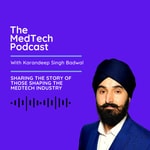BioSpace – Détails, épisodes et analyse
Détails du podcast
Informations techniques et générales issues du flux RSS du podcast.

BioSpace
BioSpace
Fréquence : 1 épisode/4j. Total Éps: 152

Classements récents
Dernières positions dans les classements Apple Podcasts et Spotify.
Apple Podcasts
🇬🇧 Grande Bretagne - lifeSciences
01/08/2025#17🇺🇸 États-Unis - lifeSciences
01/08/2025#20🇫🇷 France - lifeSciences
01/08/2025#32🇨🇦 Canada - lifeSciences
31/07/2025#92🇬🇧 Grande Bretagne - lifeSciences
31/07/2025#29🇺🇸 États-Unis - lifeSciences
31/07/2025#18🇫🇷 France - lifeSciences
31/07/2025#23🇨🇦 Canada - lifeSciences
30/07/2025#80🇬🇧 Grande Bretagne - lifeSciences
30/07/2025#17🇺🇸 États-Unis - lifeSciences
30/07/2025#20
Spotify
Aucun classement récent disponible
Liens partagés entre épisodes et podcasts
Liens présents dans les descriptions d'épisodes et autres podcasts les utilisant également.
See all- https://www.abbvie.com/
17 partages
- https://www.iqvia.com/
16 partages
- https://www.biospace.com/
8 partages
- https://www.linkedin.com/in/lorielliskatz/
56 partages
- https://www.linkedin.com/in/michaeljking/
10 partages
- https://www.linkedin.com/in/chiachiasun/
9 partages
Qualité et score du flux RSS
Évaluation technique de la qualité et de la structure du flux RSS.
See allScore global : 43%
Historique des publications
Répartition mensuelle des publications d'épisodes au fil des années.
Future-Proofing: Inclusive and Protective Patient Strategies
jeudi 29 août 2024 • Durée 25:15
As the legal landscape continues to evolve, the uncertainty surrounding diversity, equity and inclusion (DEI) initiatives increases though the life sciences industry continues to move forward with DEI initiatives to include all patients in clinical trials.
In this episode, our guests discuss framing strategies designed to protect DEI initiatives from legal challenges. Additionally, the guests acknowledge the importance of clinical trial sites in gaining patient trust. We also address the increased burden technology is putting on the sites as well as patients, suggesting potential ways to reduce these burdens.
Host
Lori Ellis, Head of Insights, BioSpace
Guests
Otis Johnson, PhD, MPA, Principal Consultant and Co-founder, Trial Equity
Pamela Tenaerts, MD, MBA, Chief Science Officer, Medable
Chris Hart, Partner, Co-Chair, Privacy and Data Security Group, Foley Hoag LLP
Patrick Floody, Executive Director, Global Clinical Trial Services, Regeneron
Ken Getz, Executive Director, Tufts Center for the Study of Drug Development; Professor, Tufts University School of Medicine
Disclaimer:The views expressed in this discussion by Patrick Floody are his own and do not represent those of Regeneron.
A Tough Ending, New Beginnings and China-U.S. Biopharma Relations
mercredi 28 août 2024 • Durée 15:21
Gene editing startup Tome Biosciences is laying off nearly its entire workforce, as biopharma companies continue to face challenges in the current market. Meanwhile, Bayer, which cut 1,500 jobs in May, is parting with another 150 in Basel, Switzerland. On the other side of the spectrum, two new companies debuted last week. Novartis and Versant Ventures launched Borealis Biosciences to develop RNA medicines for kidney diseases, and BridgeBio spawned GondolaBio to focus on therapies for genetic and rare diseases. In Q2, biopharma VC funding reached its highest quarterly level since the same quarter in 2022, according to PitchBook.
Separately, U.S.-China biopharma relations are making headlines again, with a House committe writing to the FDA comissioner about U.S. companies working with the Chinese military on potentially unethical clinical trials. And in case you missed it, a special edition of ClinicaSpace this week focuses on the obesity and diabetes space—a combined market that is expected to exceed $200 billion within the next decade.
Pfizer’s Oral GLP-1 Push, Lilly Vs. Novo and PBMs Under Pressure
mercredi 17 juillet 2024 • Durée 13:55
Pfizer stole the show late last week with the announcement that it will move forward with its oral GLP-1 analog danuglipron. While Pfizer may hope to advance in the already crowded race to bring an oral GLP-1 to market, some analysts reacted to the news with caution, mainly due to lack of data.
Meanwhile, in the injectable GLP-1 space, it’s primarily a two-horse race between Novo and Lilly. While Novo had a two-year head start, Lilly has been picking up ground since the November 2023 approval of Zepbound (tirzepatide). A recent observational study saw tirzepatide outperform Novo’s semaglutide in helping patients to lose weight, and some analysts predict Lilly will indeed gain majority market share within a few years in part due to this potential efficacy advantage, though manufacturing is a complicating factor that currently favors Novo.
Separately, the drug pricing debates heat up after the Federal Trade Commission released a scathing report last week about the business practices of pharmacy benefit managers (PBMs), noting how they charge payers higher prices than what they pay to pharmacies, profiting at the expense of patients and pharmacies. But biopharma firms must share the blame, and the Senate last week unanimously passed a bipartisan bill that would limit their use of patent thickets to maintain exclusivity, thereby making it easier for generic competitors to enter the market.
Finally, several neurology-focused companies are hoping to bring new drugs to the market. BioSpace highlights five key neuro readouts to watch in the second half of 2024 in the Alzheimer’s, schizophrenia, depression and rare disease spaces.
Lilly’s I&I Play, ADC Investment and GLP-1 Momentum Persists
mercredi 10 juillet 2024 • Durée 18:12
After securing approval last week for Alzheimer’s drug Kisunla, Eli Lilly was back in the news Monday with the $3.2 billion acquisition of immunology biotech Morphic Holding. This represents another deal in the lucrative immunology and inflammation (I&I) space, which saw $12.3 billion in M&A activity last year, with analysts predicting this momentum would carry over into 2024.
Investment continues to pour into another hot therapeutic space: antibody-drug conjugates (ADCs). British biopharma company Myricx Bio netted a £90 million ($115.5 million) Series A round to expand its ADC platform and advance its pipeline into the clinic. Several other pharmaceutical companies are looking to capitalize on the potential of the ADC market—which is estimated to reach nearly $30 billion by 2028—including Johnson & Johnson, Genmab and Ipsen, who have all struck M&A deals in the space this year. Still others, including Sutro Biopharma and Mersana Therapeutics, are hoping to supercharge their potential via the immune system with immunostimulatory ADCs.
And GLP-1s continue to make headlines, with one study linking semaglutide to an optic nerve condition that can cause sudden vision loss, and another showing the drug class could significantly lower the risk of 10 obesity-related cancers in diabetes patients. Novo Nordisk’s Wegovy has successfully expanded into China, where its patent will expire in less than two years, paving the way for biosimilar competition, and Lilly’s Mounjaro elicited greater weight loss than Novo’s Ozempic in a new observational study.
FDA Approves Lilly’s Donanemab While Rejections Highlight Manufacturing Issues
mercredi 3 juillet 2024 • Durée 15:08
The biggest news of the week was the FDA approval of Eli Lilly’s Kisunla (donanemab) on Tuesday. While not unexpected, it was one of the year’s most highly anticipated decisions. And last week saw another big approval from the FDA—that of Verona’s novel COPD drug.
But the regulator has also dropped three Complete Response Letters on drugmakers in the last seven days. Two of these were directly related to issues with third-party manufacturers. Though it’s unclear if those contract development and manufacturing organizations (CDMOs) were overseas, the FDA has flagged several concerns regarding manufacturers in India and China that have contributed to extreme drug shortages in the U.S. This will be particularly important in the face of a potential decoupling from Chinese CDMOs should the BIOSECURE Act become law, as India has been one country eyeing the opportunity.
Meanwhile, Korean company Samsung Bio struck a $1 billion manufacturing contract with an undisclosed U.S. biopharma company. Among the many products the manufacturer makes are the piping hot antibody-drug conjugates, or ADCs. The global market has already exceeded $10 billion and is estimated to grow to nearly $30 billion by 2028. As evidence of the excitement surrounding ADCs are five major deals struck by biopharma companies this year.
It’s not all good news for the ADC space, though, as one of those three FDA rejections was handed to Merck and partner Daiichi Sankyo’s investigational ADC for the treatment of certain non-small cell lung cancers. Meanwhile, BMS backed out of a collaboration with Eisai to develop an ADC being investigated in ovarian, peritoneal and fallopian tube cancers, as well as non-small cell lung cancer. We will continue to watch the industry’s strategies unfold as biopharma firms compete for a piece of that exploding ADC market.
DE&I: Understanding That We Don’t Understand at Molecular Level
mardi 2 juillet 2024 • Durée 23:18
This is the second episode of Denatured's discussion on diversity, equity and inclusion (DE&I).
Data is the essential piece for both science and technology. The lack of DE&I data is becoming even more imperative as we move towards personalized medicines. Without understanding why there are differences in outcomes, the industry will continue to see worsening outcomes. However, DE&I is still not at the forefront of the mind during clinical trial designs, which influences not only the training but the application of AI models. Additionally, what this means not only for life sciences but also for healthcare providers as more of the healthcare industry adopts AI to assist with patient care.
Host
Lori Ellis, Head of Insights, BioSpace
Guests
Dr. Ali Pashazadeh, CEO,Treehill Partners
Dr. Charlotte Jones-Burton, Board Member, bluebird bio; Founder & President, Women of Color in Pharma
Chia Chia Sun, Chief Commercial Officer, Fab Biopharma; CEO, Damiva
Phyllis Greenberger, Senior Vice President, Policy & Regulatory, Healthy Women
Dr. Todd Rudo, Chief Medical Officer, Clario
Sarepta’s Big DMD Approval, Alnylam’s Clinical Win and ADA Highlights
mercredi 26 juin 2024 • Durée 12:34
The biggest news of the last week was easily the expanded approval of Sarepta’s Duchenne muscular dystrophy gene therapy, Elevidys. CBER Director Peter Marks again overruled FDA staff members and review teams to grant the therapy full approval and a broad label expansion despite its missing the primary endpoint in a Phase III confirmatory study.
This approval has us thinking about other big FDA decisions to watch this year, first and foremost, Eli Lilly’s anti-amyloid antibody donanemab. If given the green light, donanemab will be a direct competitor to Biogen and Eisai’s Leqembi, also a disease-modifying anti-amyloid antibody. Beyond that, Verona Pharma is expecting a decision Wednesday on ensifentrine, which could be the first novel mechanism for chronic obstructive pulmonary disease in over a decade, and in August, the FDA is set to decide on Lykos’ MDMA-assisted PTSD therapy, which an advisory committee voted against earlier this month.
Then this week, Alnylam scored big with a Phase III win in transthyretin amyloidosis with cardiomyopathy (ATTR-CM). In what Alnylam CMO Pushkal Garg called “overwhelmingly positive data,” Amuvttra significantly lowered the risk of death and recurrent cardiovascular events in patients with ATTR-CM.
Meanwhile, biopharma conference season continues with the American Diabetes Association’s annual conference held this past weekend. Eli Lilly’s blockbuster drug Zepbound “significantly improved” disease severity in patients with obesity and sleep apnea, and Altimmune racked up a Phase II victory for pemvidutide, which was effective at helping patients lose weight while retaining lean muscle.
BioSpace at #DIA2024: Workforce Trends, Trial Design, Peter Marks & Recap
jeudi 20 juin 2024 • Durée 09:34
BioSpace's Lori Ellis and Chantal Dresner are bringing live updates from #DIA2024 in San Diego this week where we've been attending sessions on trial design, digital twins, cell and gene therapy regulation, clinical research workforce trends, professional development and many more. We discuss some of our key takeaways and event highlights, including Lori's exclusive interview with CBER director Dr. Peter Marks.
Hosts
Lori Ellis, Head of Insights, BioSpace
Chantal Dresner, VP of Marketing, BioSpace
Challenging Research Models to Improve Health Equity
jeudi 20 juin 2024 • Durée 23:16
Diversity, equity and inclusion (DEI) continues to be a challenge for drug and medical device developers. While there has been some improvement in clinical trials, our guests note that unless there is a commercial or regulatory need, DEI is still an afterthought for many developers when designing clinical trials.
Host
Lori Ellis, Head of Insights, BioSpace
Guests
Ali Pashazadeh, CEO,Treehill Partners
Charlotte Jones-Burton, Board Member, bluebird bio; Founder & President, Women of Color in Pharma
Chia Chia Sun, Chief Commercial Officer, Fab Biopharma; CEO, Damiva
Phyllis Greenberger, Senior Vice President, Policy & Regulatory, Healthy Women
Todd Rudo, Chief Medical Officer, Clario
BIOSECURE’s Surprise Absence, the $100+ Billion Future Weight-Loss Market, DIA and More
mercredi 19 juin 2024 • Durée 14:41
We’re off to a rocky start this week on the clinical side, with some safety issues. BioNTech and MediLink’s ADC was placed on partial hold after multiple patient deaths, and some safety concerns were also revealed for Gilead’s blood cancer therapy magrolimab.
But on a more upbeat note, DIA in San Diego is filled with hope of collaboration and a focus on the patient experience. Head of Insights Lori Ellis joins BioSpace’s editorial team to discuss what’s she’s observed so far at the meeting and what she’s looking forward to in the coming days.
In global geopolitical news, the BIOSECURE Act was unexpectedly left out of the DoD’s spending bill. But that doesn’t mean the legislation is going anywhere, and the U.S. House of Representatives committee’s recent request that the FBI put together a briefing on GenScript Biotech highlights the ripple effect the act is having on the Chinese market.
Other news includes the busy regulatory activity from the FDA, approving the first new treatment in nearly a decade for a rare liver disease. This week, the agency will rule on full approval and a potential label expansion for Sarepta’s Elevidys.
And GLP-1s, as always, are making headlines. A new report from Global Data forecast the obesity market will reach $111 billion by 2033. This includes the blockbuster GLP-1s as well as alternatives being pursued by multiple companies. Just last week, Sytis Bio launched with a lead program consisting of an oral drug meant to mimic the effects of oral bypass surgery.
Finally, there’s some good news on the financing front, as J.P. Morgan raised over $500 million in its first biotech VC fund. It’s the latest sign of the uptick in VC funds devoted to biopharma and tech industries.









